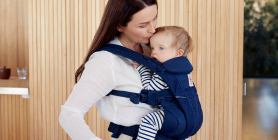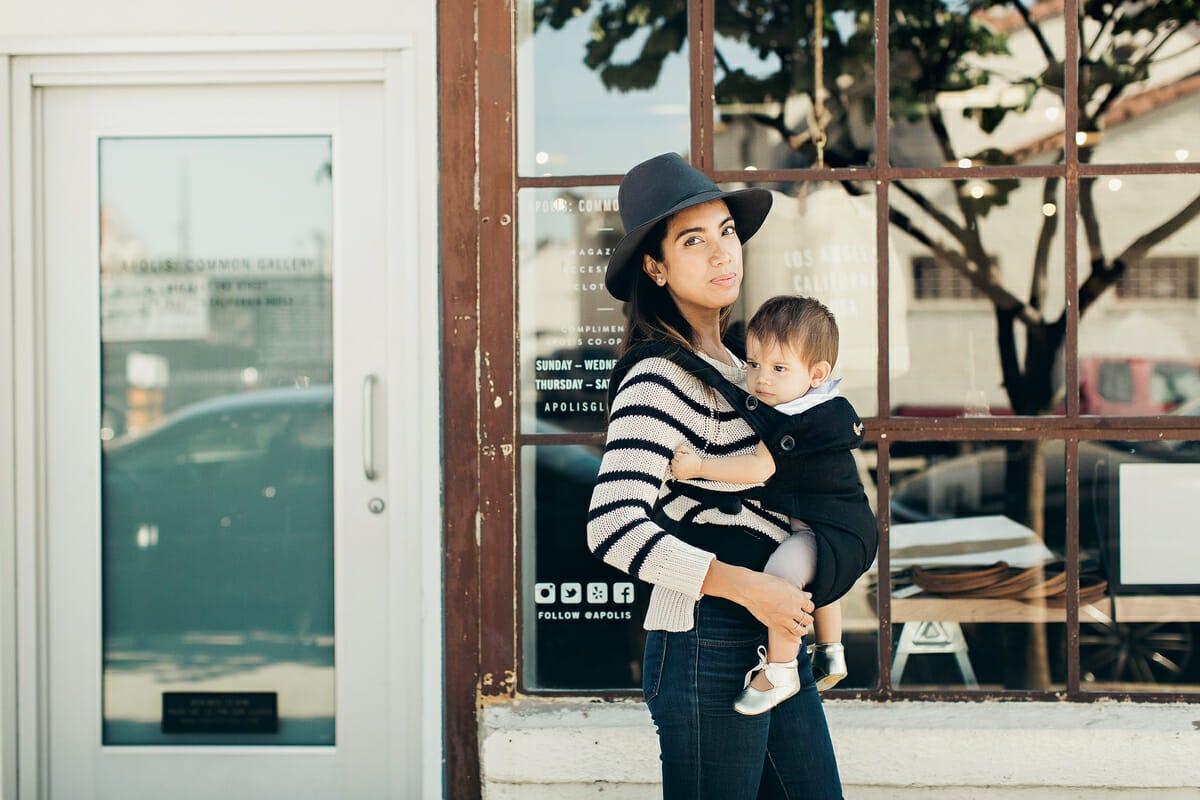
Jump to a Section:
Newborn Stage: Sleeping
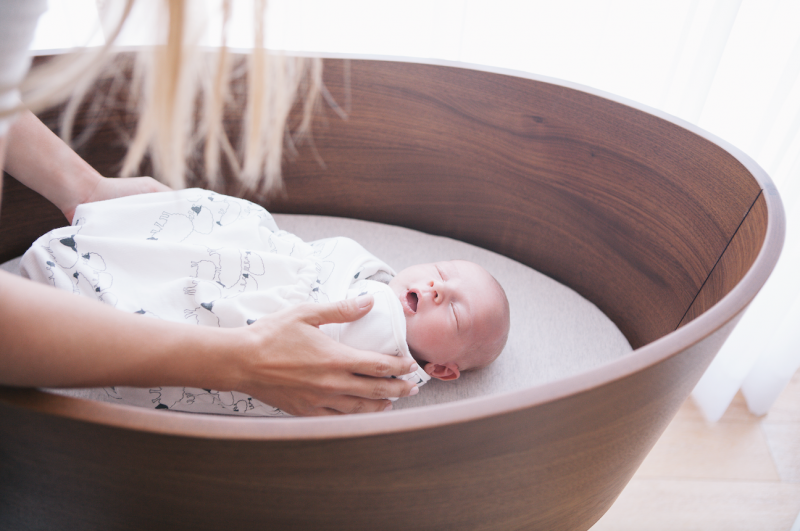 During that first week, your baby will sleep 16-18 hours a day, typically with 2-hour sleep spurts in between short windows of wake time and feedings. From 2-6 weeks, your newborn should get 15-18 hours of sleep with 3-4 naps. Between 2-3 months, 14-16 hours of sleep are recommended with 3-4 naps.
Swaddling a newborn is a great way to soothe fussy babies and a safer way for newborns to sleep. If you’re worried about swaddling with a blanket, try a baby swaddler instead. It makes swaddling easy for tired parents, and it’s comfortable and safe for newborns. Once your baby can roll from her back to tummy, usually between 3-5 months, stop swaddling.
During that first week, your baby will sleep 16-18 hours a day, typically with 2-hour sleep spurts in between short windows of wake time and feedings. From 2-6 weeks, your newborn should get 15-18 hours of sleep with 3-4 naps. Between 2-3 months, 14-16 hours of sleep are recommended with 3-4 naps.
Swaddling a newborn is a great way to soothe fussy babies and a safer way for newborns to sleep. If you’re worried about swaddling with a blanket, try a baby swaddler instead. It makes swaddling easy for tired parents, and it’s comfortable and safe for newborns. Once your baby can roll from her back to tummy, usually between 3-5 months, stop swaddling.
Infant Stage: Sleeping
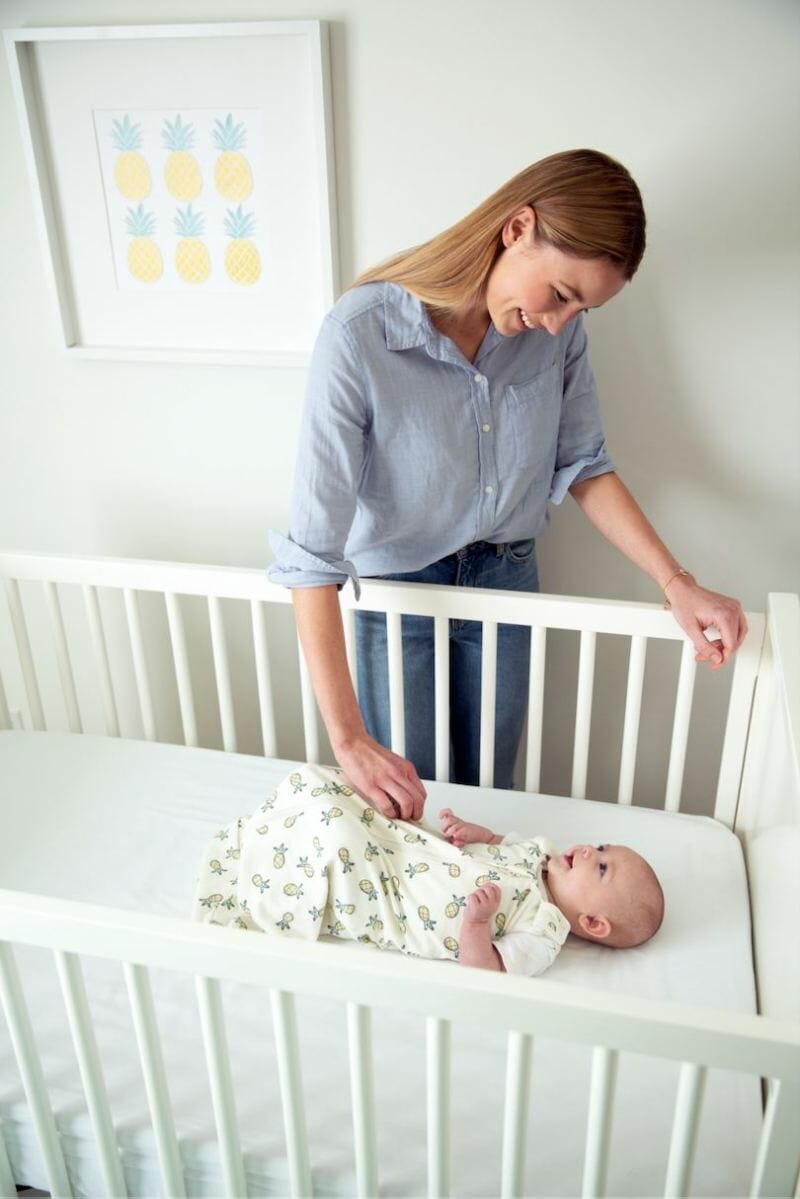 Between 4-6 months, your baby should sleep 12-15 hours a day and take 2-3 naps, but also be prepared for the 4-month sleep regression, the first and most common of potentially several sleep regressions your child will go through. Your baby’s sleep schedule for 7-10 months should include 11-15 hours of sleep with 2-3 naps, and hopefully longer stretches of nighttime sleep. At 10-12 months, your baby should sleep 11-14 hours and take 2-3 naps. Since loose blankets still aren’t safe for your baby in a crib during this stage, use a baby sleeping bag instead.
SHOP Baby Sleeping Bags
Between 4-6 months, your baby should sleep 12-15 hours a day and take 2-3 naps, but also be prepared for the 4-month sleep regression, the first and most common of potentially several sleep regressions your child will go through. Your baby’s sleep schedule for 7-10 months should include 11-15 hours of sleep with 2-3 naps, and hopefully longer stretches of nighttime sleep. At 10-12 months, your baby should sleep 11-14 hours and take 2-3 naps. Since loose blankets still aren’t safe for your baby in a crib during this stage, use a baby sleeping bag instead.
SHOP Baby Sleeping Bags
Newborn Stage: Feeding
The first couple of days after giving birth your body produces colostrum, and your baby can only handle about 1 teaspoon of it per feeding. By three days old your body should be producing milk, and your newborn should breastfeed every 2-3 hours and can eat 1-2 ounces of milk per feeding. By 2 weeks old he can drink 2-3 ounces of milk per feeding, and then by 2 months old your newborn should eat 4-5 ounces every 3-4 hours. Plan to breastfeed 8-12 times a day. Breastfed babies tend to eat smaller, more frequent feedings than formula-fed babies. (Hot tip: You can even breastfeed in the baby carrier!) If formula feeding, your newborn should eat 2-3 ounces every 3-4 hours during his first few weeks of life. Around 1 month old your newborn can eat up to 4 ounces of formula every 4 hours. The American Academy of Pediatrics recommends that on average babies eat 2.5 ounces of formula a day for each pound of their body weight. But all babies are different. So if your baby shows signs of hunger, then feed him more. Just be careful not to overfeed. Formula-fed babies are more likely to overfeed because it takes less effort to drink from a bottle than breastfeeding.Infant Stage: Feeding
At 4 months old your baby can drink 4-6 ounces of breastmilk or formula per feeding every 3-5 hours, and then at 6 months old she can drink up to 8 ounces every 4-5 hours. You also want to start offering solid foods around 6 months. You’ll know your baby is ready if she can sit up in an infant seat or high chair with good head control, opens her mouth when food comes her way (or your way), and has at least doubled her birth weight. After a few months of offering solid foods your baby’s diet should include a variety of breastmilk or formula, vegetables, fruits, meats, cereal, and eggs.Newborn Stage: Diapering
During the first four or so months, your baby will urinate about 20 times a day. This doesn’t mean you have to change his diaper 20 times a day, but you should change it every 2-3 hours. If your baby poops, then change his diaper right away. At 1 week old he will have a bigger stomach and can eat more, which also means the number of daily diapers you change will also increase. On average, newborns go through 10-12 diapers a day. While your newborn has a healing umbilical cord stump, fold down the front of the diaper so it doesn’t rub against it. This isn’t necessary if your diapers already fasten underneath the belly button.Infant Stage: Diapering
When your baby is a few months old you should still change her wet diapers every 2-3 hours and poopy diapers as soon as you can. Newborns go through more diapers than older babies, so the good news is you shouldn’t be going through as many diapers now. Most 6-month-old babies go through 5-6 diapers a day. The one thing you will start dealing with during this stage is an active baby. Your baby will probably want to squirm, wiggle, or kick while you change her diaper. You can either ignore it—any kind of reaction can cause your baby to keep doing it—or distract your baby while changing her by singing or giving her something to hold.Newborn Stage: Developmental Milestones
Children’s development is categorized into social, language, and motor development categories. Here are some things your newborn may start doing between birth and 3 months old:- Briefly lifting his head while on his stomach
- Moving his arms and legs
- Recognizing familiar faces and voices
- Focusing on and following moving objects
- Bringing his hands together and to his mouth
- Grasping onto things
- Making cooing and other noises besides crying
- Smiling and laughing
Infant Stage: Developmental Milestones
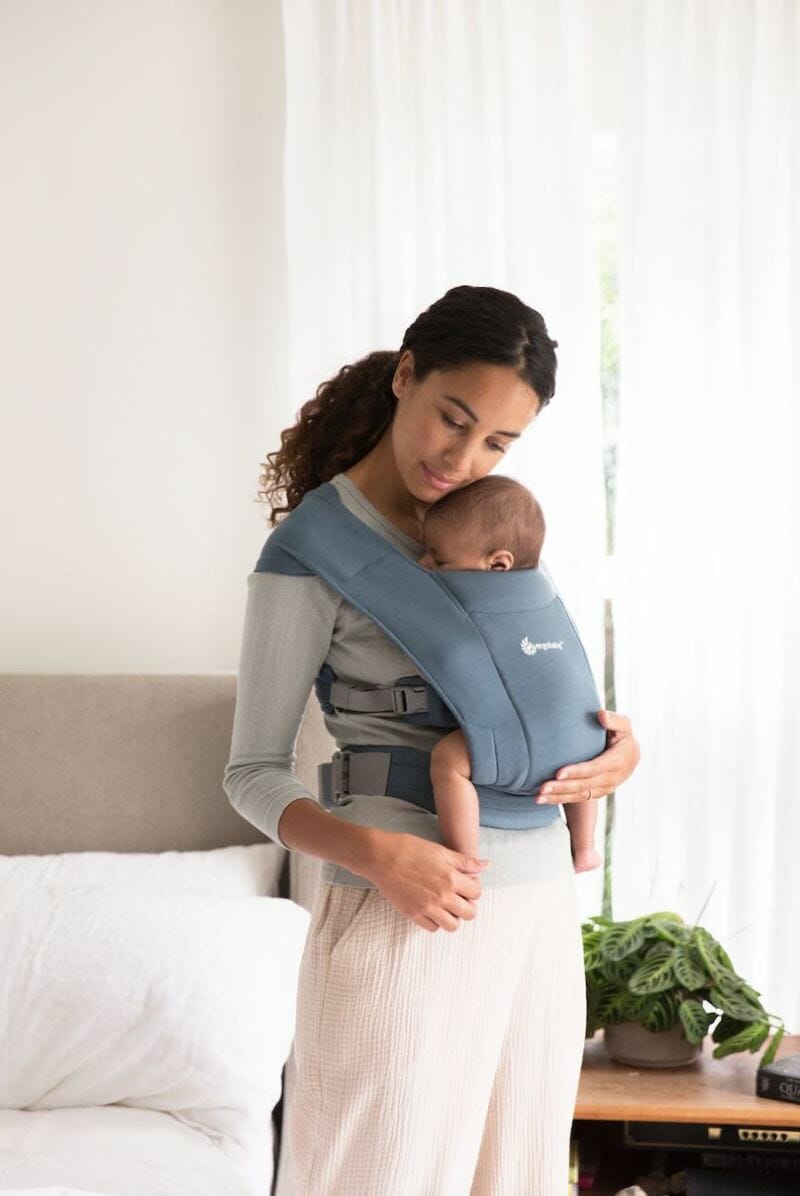 From 4-12 months, here are some things you can expect your baby to start doing:
From 4-12 months, here are some things you can expect your baby to start doing:
- Rolling from tummy to back and back to tummy
- Grabbing his feet
- Holding her head up on her own
- Expressing and recognizing emotions
- Sitting up without any support
- Babbling
- Listening and understanding certain words
- Putting everything into her mouth
- Developing separation anxiety
- Pulling up on things to stand
- Crawling
- Doing the pincer grip
- Feeding herself
- Waving hello and goodbye
- Banging, dropping, and throwing objects
- Walking or trying to walk
- Saying simple words
Newborn Stage: Carriers
Search online and you’ll find numerous lists of everything you need to prepare for a baby. But when it comes to newborn essentials, you can dwindle that list down to clothes, diapers, blankets, baby monitor, bed, infant car seat, and a newborn carrier. The Embrace newborn carrier is perfect for this phase. It combines the soft, cozy feel of a wrap with the simplicity of a structured baby carrier. It’s compact, comfortable, and safe for you and your newborn.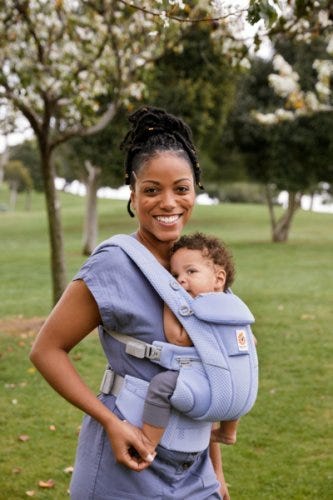
Infant Stage: Carriers
As your baby grows, you’ll still need those essential baby items, but you also need to prepare for things you may not have thought of. One of those things is getting a different baby carrier and accessories for it, such as a drool bib. While Embrace is designed for a newborn, Ergobaby’s Omni 360 All Positions Carrier is the best next step. It provides ergonomic support and lets your developing, curious baby interact with his surroundings in four different carrying positions. SHOP Omni 360 CarrierInfant and Newborn Essentials
Even though the infant and newborn phases are very different, there are some items you can use through both!All-in-One Carrier
If you'd rather have one carrier throughout your babywearing journey, Omni Breeze or Omni Dream is the way to go. These All-in-One, Four-Position Carriers require no infant insert and are good from 7-45 lbs! For those who live in warmer weather or whose primary concern is a breathable carrier, Omni Breeze is rated #1 in breathability!Omni Dream, while also breathable, is designed for snuggles. The fabric boasts of unparalleled softness that is great for time at home or out and about.

























